Golden Retrievers bring so much joy into our lives with their fun loving nature and boundless energy. But it’s not all about love and play: You need a right diet plan for them to ensure wagging tail and shiny smiles. Our pets, like humans, need a balanced diet to thrive. The food they eat affects their overall health, lifespan, and even their energy levels during those fun games of fetch! There are so many different dog food brands and alternatives available that it can be difficult to provide your Golden Retriever feeding with a balanced diet. In this blog, you’ll learn what nutrients your Golden Retriever needs, what feeding methods are best for their age and lifestyle, and the most common Golden Retriever feeding mistakes to avoid. We’ll cover everything from choosing the right type of dog Food to understanding portion control and identifying potential food allergies. Ultimately, you’ll be able to make an informed decision about what to feed your Golden Retriever so they get the nutrients they need to live a long, healthy, happy life with you.
Contents
- 1 Understanding the Nutritional Needs of a Golden Retriever
- 2 Choosing the Best Food for a Golden Retriever Feeding
- 3 How Much a Golden Retriever Should Eat?
- 4 Best Golden Retriever Feeding Methods and Plans
- 5 Foods You Should Never Give Your Golden Retriever
- 6 Safely Transitioning to a New Diet
- 7 The Role of Treats and Supplements in a Golden Retriever’s Diet
- 8 Raw vs. Commercial Dog Food: Pros and Cons
- 9 The Raw Food Debate
- 10 Signs of Food Allergies and Intolerances
- 10.1 Common Food Allergies in Golden Retrievers
- 10.2 How to Identify and Manage Allergies
- 10.3 How should I approach Golden Retriever feeding?
- 10.4 How much should I feed my Golden Retriever daily?
- 10.5 What’s the best feeding schedule for Golden Retrievers?
- 10.6 Should I free-feed my Golden Retriever or use scheduled meals?
- 10.7 What human foods are safe for a Golden Retriever feeding?
- 11 Conclusion
Understanding the Nutritional Needs of a Golden Retriever
Golden Retrievers, like other dogs, require a balanced diet rich in essential nutrients to ensure optimal health. These nutrients are important for growth, development, energy levels, and overall health.
Essential Nutrients for a Healthy Diet
Protein:
Protein is essential for the developing and repairing of muscles, organs, and tissues. Golden Retriever feeding require a protein-rich diet (fish, beef, chicken, lamb etc.), especially during puppyhood and adolescence, for their growth and development.
Fats:
Fats are a concentrated source of energy and promote healthy skin and hair. Vital fatty acids, such as omega (3, 6), are important for maintaining healthy coat and skin.
Carbohydrates:
Carbohydrates provide energy for biological processes and daily activities. Choose complex carbohydrates (oatmeal, brown rice, millet and quinoa, etc.), for sustained energy. It will help to promote digestive health, support a healthy weight, and regulate blood sugar levels.
Water:
Water is an essential nutrient for hydration, digestion, and organ function. Provide your Golden Retriever fresh and clean water.
Vitamins and Minerals:
| Vitamins and Minerals | Benefits |
| Vitamins A & E | Vision, Healthy skin and coat |
| Vitamin C | Antioxidant, Boost immune system |
| Vitamin D | Strong bones and teeth |
| Vitamins B | Healthy energy metabolism and nervous system health |
| Calcium, magnesium, and phosphorus | Strong bones and teeth |
| Omega-3 fatty acids | Healthy skin and coat |
| Probiotics and Digestive enzymes | Gut health and nutrient absorption |
| Glucosamine and Chondroitin | Mild anti-inflammatory and an ingredient that helps with cartilage repair |
| Methylsulfonylmethane | Reduce inflammation and pain in joints |
How Nutritional Needs Change with Age and Size Puppies:
Puppies (0-12 months):
Puppies (0-12 months) require a diet rich in protein and calories to grow and develop quickly. They also need special nutrients (phosphorus and calcium), to help build healthy bones.
Adult Golden Retrievers (1-7 years):
Adult Golden Retrievers (1-7 years) require a balanced diet to maintain energy, health and weight.
Senior Dogs (7+ Years):
As Golden Retrievers age 7 and older, their nutritional needs change with slow metabolism. Senior dogs need a balanced diet with rich nutrition and low calories (glucosamine and chondroitin), for joint health and organ function.
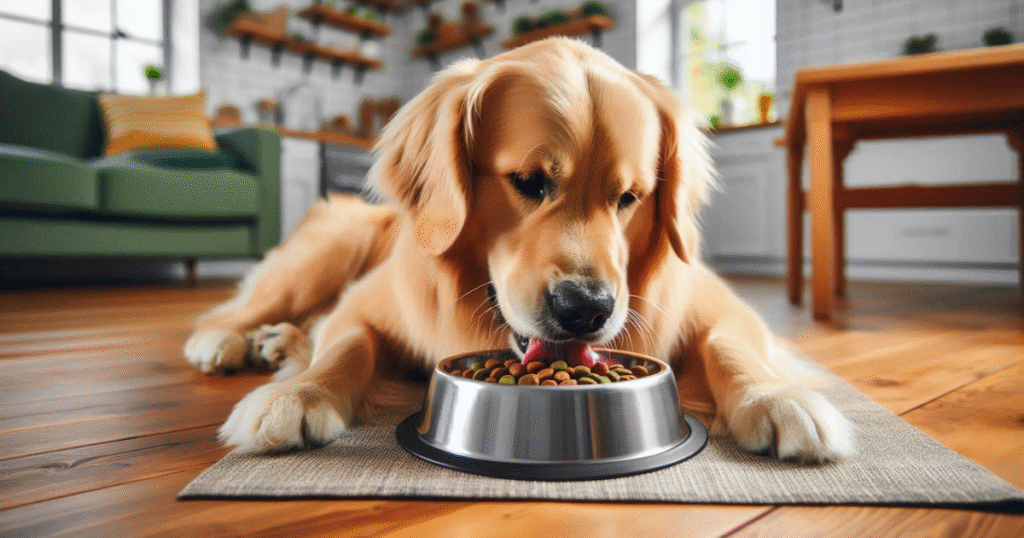
Choosing the Best Food for a Golden Retriever Feeding
There are number of best dog foods available in the market, choosing the right food is a big challenge. Balanced food with right ingredients food will boost its health and growth. Here is a detailed overview of getting a key ingredients and food for you champ:
Kibble, Wet Food, and Raw Food Dry Food:
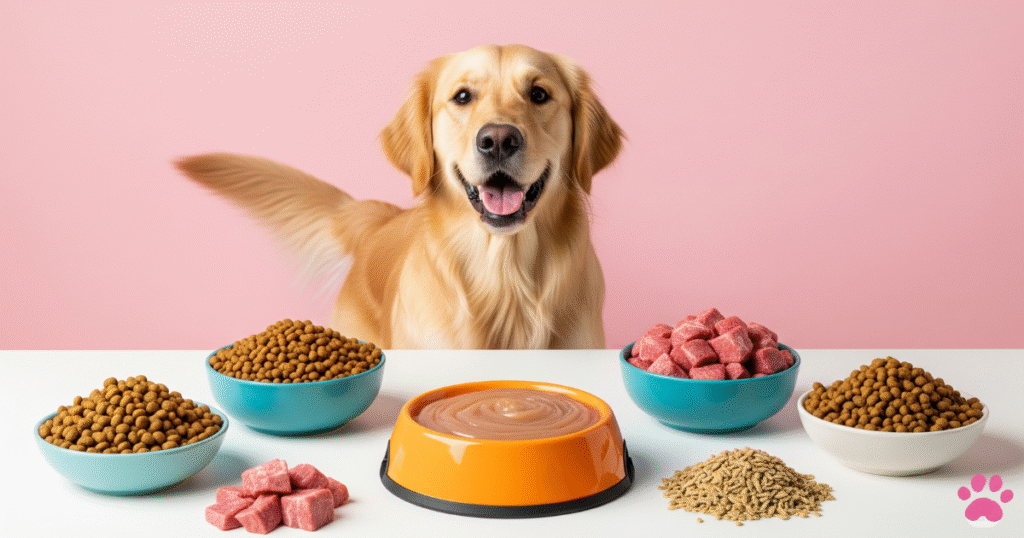
Dry food
Dry food are the most affordable and famous dog food. It has a long shelf life. Also, it promotes oral health of dogs by encouraging chewing.
Wet/Canned Food:
Wet and canned food contains a lot of moisture, which is beneficial for dogs if they don’t drink enough water. It can also be more appealing to choosy eaters.
Raw Food:
Raw food contains natural unprocessed vegetables, meat, and bones. A balanced raw food can provide all necessary nutrients to your Golden Retriever. Before starting a raw food diet, consult your veterinarian or nutritionist.
Important Ingredients to Look for
High-Quality Animal Proteins:
Choose a dog food with high-quality animal proteins, such as beef, chicken, lamb and fish. It helps for growth of tissues, muscles, and organs.
Healthy Fats:
Healthy fats provide energy to you dog and helps for healthy skin and shiny coat. Choose food with rich sources of omega (3-6) fatty acids, such as coconut oil, salmon oil, or flaxseed oil.
Whole Fiber and Grains:
Whole fiber and grains, such as peas, sweet potatoes, and brown rice. It helps in digestion and provide essential nutrients.
Avoid Artificial Ingredients:
Always avoid dog food that is free of artificial fillers, preservatives by-product of raw meats. They have low nutritional value and may have adverse effects on your Golden Retriever’s health.
Choosing the Right Food for Golden Retriever Feeding:
Life Stage:
Consider your Golden Retriever’s life stage (puppy, adult, senior) and choose a food that meets his specific needs.
| Life Stage | Age Range | Nutritional Needs | Recommended Food |
| Puppy | 0 – 15 months | High protein for growth, DHA for brain and eye development, calcium for bones. | Large-breed puppy food with 22–24% protein and DHA. E.g., Royal Canin Golden Retriever Puppy, Hill’s Science Diet Large Breed Puppy. |
| Adult | 15 months – 7 years | Balanced protein and fat, glucosamine for joints, antioxidants for immunity. | Large-breed adult food with 23–25% protein. E.g., Blue Buffalo Life Protection Formula, Wellness Core Grain-Free. |
| Senior | 7+ years | Lower calories, joint support (glucosamine & chondroitin), antioxidants, fiber for digestion. | Senior dog food with reduced fat. E.g., Hill’s Science Diet Senior Large Breed, Orijen Senior. |
Activity Level:
Dogs having physical activities requires a diet with higher in calories and protein.
Allergies and Sensitivities:
Sometimes dogs are sensitive they are allergic to some foods. If your Golden Retriever has intolerance or allergy, choose a diet with restricted ingredients or a recipe specifically designed sensitive stomachs.
How Much a Golden Retriever Should Eat?
Choosing the right quantity and quality of food for your Golden Retriever is important to maintain growth, healthy and weight for avoiding malnutrition or obesity. The diet should be based on your Golden Retriever’s age, health and exercise.
Golden Retriever Feeding Guidelines for Age and Activity
Puppies (2 – 6 months):
Growing puppies require regular meals throughout the day. Feed three to four little meals every day until the baby is six months old.
Puppies (6 – 12 months):
Puppies aged 6 months to 12 months are getting bigger, but they still require balanced diet for growth, so you may gradually shift to 2 to 3 meals per day.
Adults (1 – 7 years):
Adult Golden Retrievers require a minimum of two meals every day. However, the exact amount of food required depends on the dog’s level of activity. Dogs that are inclined to be active demand larger meals than canines who are less active.
Senior Dogs (7+):
As Golden Retrievers age past seven years, their metabolism slows and their calorie requirements may decrease. Feed in portion quantities to avoid gaining weight. Ask your veterinarian for nutrition advice for elderly dogs. They may have additional health concerns that require dietary changes.
Measure portions to avoid overfeeding.
Calorie Needs:
Rather than assuming, you can calculate your Golden Retriever’s daily calorie requirements considering his age, weight, and activity level. This information can be found on food packages. For specialized guidance, visit animal nutritionist or veterinarian.
Adjust Portions:
Regularly check your Golden Retriever’s physical condition and weight. As your Golden Retriever loses or gains weight, adjust the portions accordingly.
Risks of Obesity and Malnutrition:
Obesity:
Overeating will lead to obesity, which raises the risk of diabetes, heart disease, and joint difficulties.
Undernutrition:
Undernutrition will lead to malnutrition and its cause numerous health problems.
Best Golden Retriever Feeding Methods and Plans
Maintaining a regular feeding plan for your Golden Retriever is equally vital as selecting the correct food. It can aid digestion, minimize overeating, and make it simpler to manage food consumption.
Ideal Golden Retriever Feeding Times and Frequency
Consistency is Key:
Feeding your Golden Retriever at the same time every day can help control his digestive system while minimizing the risk of bloating, particularly in deep-chested breeds like the Golden Retriever.
Breakfast and Dinner:
Generally adult Golden Retrievers get more benefit from eating twice a day, one in the morning and one in the evening. Puppy and older dogs may require more frequent feedings.
Free Feeding vs. Scheduled Feeding
Why free feeding is not recommended for Golden Retrievers:
It is typically not suggested that Golden Retrievers have access to food at all times (free feeding). It can cause overeating, weight gain, and obesity, which raises the risk of health issues. It can also be difficult to track food consumption and identify possible concerns, such as lack of appetite.
Benefits of Structured Feeding Times:
Planned feeding times help you to regulate portion sizes, track your Golden Retriever’s food intake, and establish a habit that can benefit their general health and well-being.
Additional Tips:
Avoid exercising after meals:
Never feed your Golden Retriever right before or after intense exercise, since this might raise the risk of stomach torsion.
Slow Feeding:
If your Golden Retriever eats too rapidly, you might want to try using a slow feeder. This will allow them to eat more slowly and prevent digestive issues.
Treats in Moderation:
Treats should be given in moderation and counted toward your dog’s daily calorie intake.
Foods You Should Never Give Your Golden Retriever
While it may be tempting to share food with your Golden Retriever, remember that some human foods can be harmful or even toxic to dogs.
Toxic Foods That Can Be Harmful.
Absolutely Avoid
The following toxic foods should never be given to your Golden Retriever:
- Chocolate: Contains theobromine, which can cause vomiting, seizures, diarrhea, and even death.
- Grapes and raisins: It can cause kidney failure.
- Onions and garlic: It can damage red blood cells and results in anemia.
- Artificial Sweetener: An artificial sweetener present in many sugar-free items that can cause instant drop in blood sugar and harm the liver.
- Caffeinated beverages and alcohol: It can cause seizures, heart problems, and tremors.Raw dough: It can easily expand in the stomach, which leads to bloating and can cause potentially fatal complications.
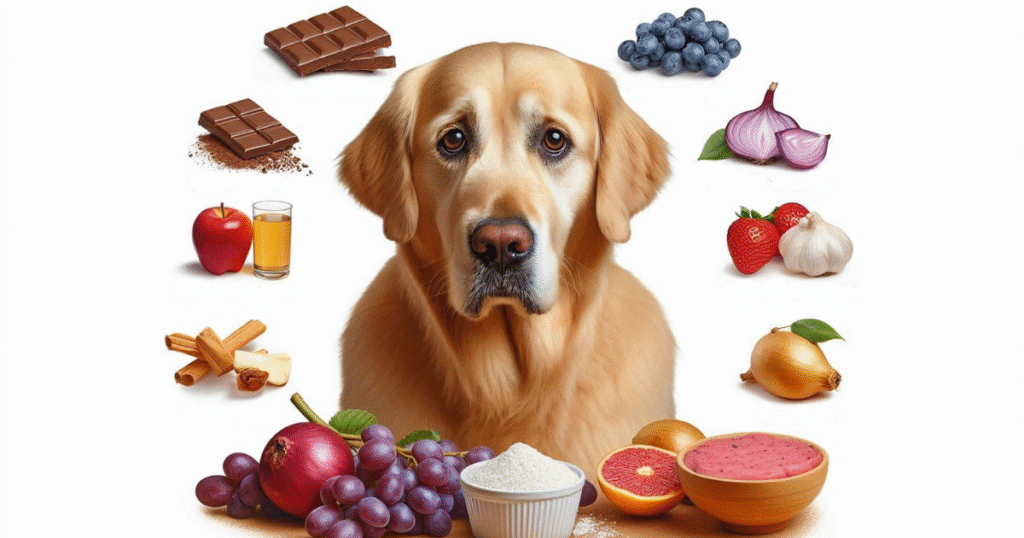
Common Foods That Are Bad for Dogs
Fatty Meats:
Feeding dog’s excessive fatty meats like sausage, fried foods, and bacon can cause digestive issues, diarrhea, vomiting and ultimately pancreatitis (a serious inflammation of the pancreas).
Dairy:
Many dogs are lactose intolerant. Dairy products such as milk, cheese, and ice cream can cause digestive issues, including vomiting and diarrhea.
Highly Processed Foods:
Highly processed diets usually contain high levels of sugar, salt, and artificial ingredients, which have little nutritional benefit and can affect your dog’s health.
Safely Transitioning to a New Diet
There are several reasons why you may want to adjust your Golden Retriever’s diet. For example, if you want to switch to a food that is better suited for a certain stage of your dog’s life, if your dog has allergies, or if you just want to try a new brand. However, sudden changes in diet can lead to digestive problems, diarrhea, vomiting, and malaise. A gradual transition is essential for a smooth and enjoyable transition.
Why are gradual diet changes important?
Avoid digestive problems:
A rapid change in nutrition might disrupt your Golden Retriever’s gut bacteria, causing digestive issues. Making moderate adjustments allows the digestive system to adjust to the new meal, avoiding these issues.
Give the gut time to adjust:
The gut need time to adapt to new nutrients, especially if the new diet has a higher protein or fiber content than the old diet. A delayed changeover allow the intestines to secrete the appropriate enzymes and adjust to the new diet.
7-Day Transition Plan
The 7-Day Transition Plan is a safe and effective way to introduce new foods:
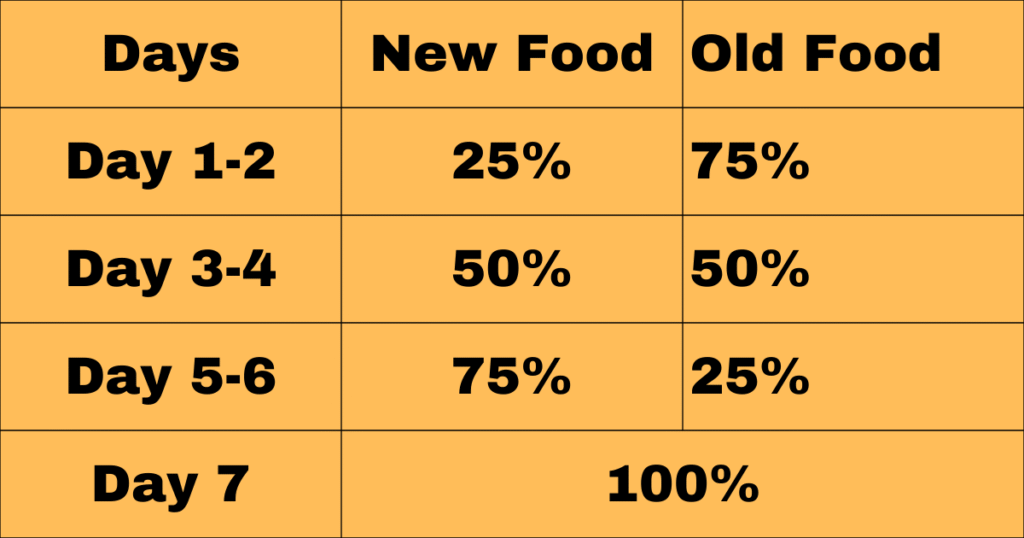
Important Notes:
Monitor your dog:
Monitor your Golden Retriever during the changeover period for digestive problems. If you observe any issues, postpone the changes or consult your veterinarian.
Consistency:
Maintain a consistent Golden Retriever feeding plan throughout the changeover period from old diet to new one.
Consult your veterinarian:
If your golden retriever has any health concerns or allergies, consult to your vet before changing his food.
The Role of Treats and Supplements in a Golden Retriever’s Diet
Treats and supplements can be beneficial to a Golden Retriever’s diet, but they should be chosen carefully and used in moderation. Treats may be an effective teaching tool and incentive for excellent behavior, while vitamins can improve your Golden Retriever’s general health.
Healthy Treats and Training Rewards
Low-Calorie, High-Protein Snacks:
Choose high-protein, low-calorie snacks. These snacks will satisfy your Golden Retriever’s appetite without making him gain weight.
Fresh Fruits and Vegetables:
Many fresh vegetables and fruits are safe and healthy snacks for dogs. Blueberries, carrots, and apples (seedless), are great choices because they contain high antioxidants and vitamins contents.
Homemade Treats:
Make a healthy homemade treats using whole food ingredients at your home. This helps you to control the ingredients and portion sizes of diet.
Healthy Supplements for Overall Health Omega-3
Fatty Acids:
Fish oil and flaxseed oil include omega-3 fatty acids, which help support healthy skin and coat, decrease inflammation, and enhance joint health.
Glucosamine and Chondroitin:
These supplements may improve joint health and mobility, particularly in senior Golden Retrievers or dogs that are prone to joint issues.
Probiotics:
Probiotics help to maintain a healthy gut microbes, which plays a vital role for digestion and immune system function.
Important Notes:
Moderate Snacks:
Snacks should not make up more than 10% of your Golden Retriever’s daily calorie consumption.
Supplement Quality:
Always choose a high-quality supplements from the trusted brands.
Consult Your Veterinarian:
Always check with your veterinarian before giving your Golden Retriever any new vitamins, especially if he has any health concerns or is receiving any medications.
Raw vs. Commercial Dog Food: Pros and Cons
The comparison between raw dog food and commercial dog food remains controversial among dog owners. Both have their own benefits and drawbacks. Knowing the pros and cons can allow you to make a better decision about your dog.
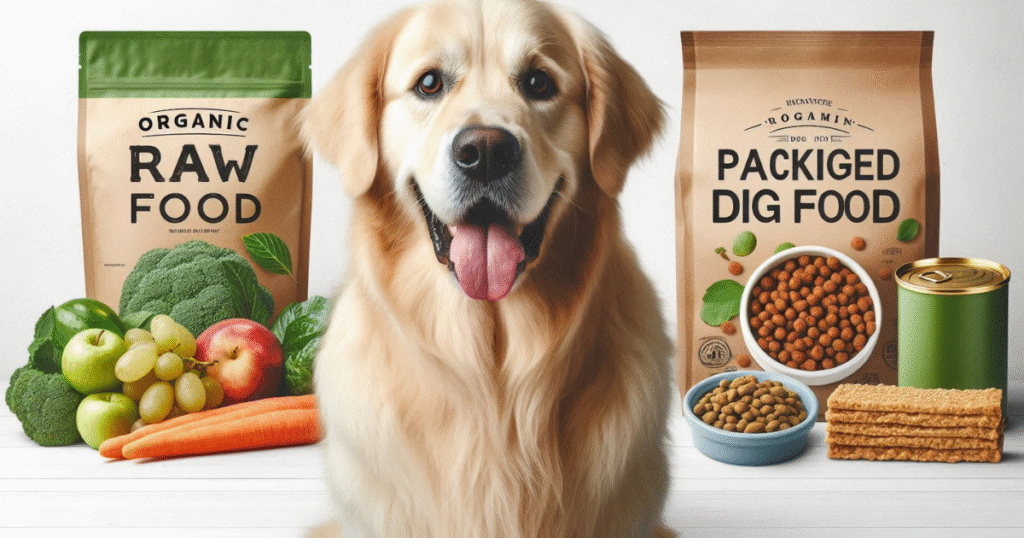
The Raw Food Debate
Potential Benefits:
Proponents of a raw food diet believe that it can result in improved digestion, more energy, healthier teeth, and a shinier coat. They suggest that a raw food diet is more similar to the diets of canine ancestors.
Potential Risks:
Raw meat still has some risks, such as the possibility of bacterial infection. Both people and pets may be at risk from this. Additionally, providing a raw diet that is balanced and has all the elements required may be challenging. It requires thorough planning and preparation.
Is a Raw Food Diet Right for Your Dog?
Consult Your Vet:
Consult your veterinarian before switching to a raw food diet. To ascertain whether a raw food diet is suitable for your Golden Retriever, they could examine their specific requirements and current health.
Balanced Diet:
If you decide to follow a raw food diet, it is important to provide a balanced diet. To ensure that all the necessary nutrients are obtained, it is necessary to pay attention to the ratio of meat, organ meats, bones, and vegetables. Working with an animal nutritionist is highly recommended.
Safer Alternatives:
Consider of safer options like frozen raw foods if you’re interested in the advantages of a raw food diet but worried about the hazards. These products reduce the chance of bacterial infection while maintaining the nutritious qualities of raw foods. Compared to conventional raw meals, they are also simpler to prepare and store.
Advantages of Commercial Dog Food:
Commercial dog food, on the other hand, is made to offer comprehensive and well-balanced nutrients, thus precise meal portioning is not necessary. To guarantee their safety and nutritional content, they go through a thorough testing and quality control process. They are also widely accessible and useful.
Signs of Food Allergies and Intolerances
Golden Retrievers may experience discomfort and a decline in their quality of life due to food allergies or intolerances, just like humans. Understanding the symptoms of these issues is crucial to managing them successfully.
Common Food Allergies in Golden Retrievers
Common Culprits:
Golden Retrievers may be triggered by food allergies to many common ingredients, such as:
Chicken and beef:
Both of these are common sources of protein in dog foods and they are common allergens to them.
Dairy:
Dairy products can cause stomach problems, and many dogs are lactose intolerant.
Wheat and soy:
These grains can trigger allergies and are frequently used as fillers in dog food.
Eggs:
Some dogs may be allergic to eggs, even though they are a healthy source of protein.
Symptoms:
Food allergies and sensitivities can show up in a variety of ways to your dogs, including:
Itchy skin:
Excessive licking, scratching, or chewing, especially on the ears, belly, and paws.
Ear infections:
Ear infections that repeatedly come back may indicate a food allergy.
Digestive issues:
Diarrhea, vomiting, flatulence, and changes in the consistency of stool.
How to Identify and Manage Allergies
Elimination Diet:
An elimination diet is the best method for determining a food allergy. This involves giving your Golden Retriever a different carbohydrate and protein source for eight to twelve weeks, after which you gradually reintroduce potential allergies to observe whether symptoms reappear. Always follow your veterinarian’s instructions when doing this.
Limited Ingredient Diets:
Once you have identified the diet or ingredients cause of the allergen, switch to a limited ingredient diet that eradicates those allergens.
Hypoallergenic Diet:
Your veterinarian could suggest a hypoallergenic food with hydrolyzed proteins that are less likely to trigger an allergic reaction if your golden retriever has severe symptoms or many allergies.
How should I approach Golden Retriever feeding?
Feed adult Golden Retrievers twice daily with high-quality dog food containing 20-26% protein. Measure portions based on weight (3-4 cups daily for 65-75 pound dogs), divide into morning and evening meals, provide fresh water, and avoid free-feeding to prevent obesity.
How much should I feed my Golden Retriever daily?
Adult Golden Retrievers need 3-4 cups of quality kibble daily, split into two meals. Puppies require 3-4 meals totaling 2-3 cups. Adjust portions based on activity level, age, and body condition – you should feel ribs easily but not see them prominently.
What’s the best feeding schedule for Golden Retrievers?
Feed adults twice daily – morning (7-8 AM) and evening (5-6 PM) – maintaining 10-12 hour intervals. Puppies under 6 months need 3-4 meals daily. Consistent schedules regulate digestion, prevent bloat, and establish healthy eating habits throughout their 10-12 year lifespan.
Should I free-feed my Golden Retriever or use scheduled meals?
Use scheduled meals, not free-feeding. Golden Retrievers are prone to obesity and will overeat when food is constantly available. Scheduled feeding twice daily helps monitor appetite, control portions, prevent weight gain, and reduce bloat risk in this deep-chested breed.
What human foods are safe for a Golden Retriever feeding?
Safe options include plain chicken, turkey, salmon, carrots, green beans, blueberries, pumpkin, sweet potato, and plain rice in moderation. Avoid chocolate, grapes, onions, garlic, xylitol, macadamia nuts, and fatty foods causing pancreatitis. Treats should be under 10% daily calories
Conclusion
One of the most important aspects of taking care of your Golden Retriever is making sure he is eating the right foods. Golden Retrievers Feeding should focus on a balanced diet that is essential to a Golden Retriever’s health. Serve him nutritious food that is suitable for his age, level of exercise, and particular medical requirements. Steer clear of artificial additives and fillers and make sure your meals contain actual, entire foods. Maintaining a regular food schedule is equally crucial because it will help with digestion and help avoid overeating. Although there is a lot of useful information on this blog, keep in mind that each Golden Retriever is different. See your veterinarian for specific dietary recommendations. They may assist you in creating a diet that takes into account your dog’s particular requirements as well as any issues that may arise. Never hesitate to seek professional guidance and ask questions. Follow us of you want to know more about Golden Retriever Feeding and Nutrition.
Dr. Nabeel A.
Hi, I’m Dr. Nabeel Akram – a farm management professional by trade and a passionate Golden Retriever enthusiast at heart. With years of experience in animal science and livestock care, I’ve built a career around understanding animals—how they live, thrive, and bring value to our lives. This blog is a personal project born from that same passion, focusing on one of the most loyal and lovable breeds out there: the Golden Retriever. Whether I’m managing farm operations or sharing insights on canine health, behavior, and care, it all ties back to one core belief—animals deserve thoughtful, informed, and compassionate attention. Welcome to a space where professional expertise meets genuine love for dogs.
Facebook |
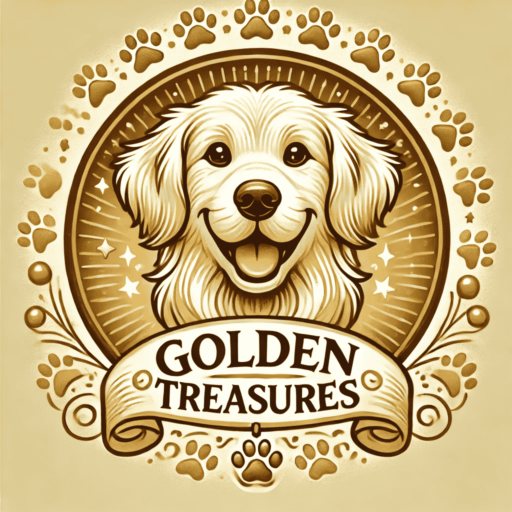
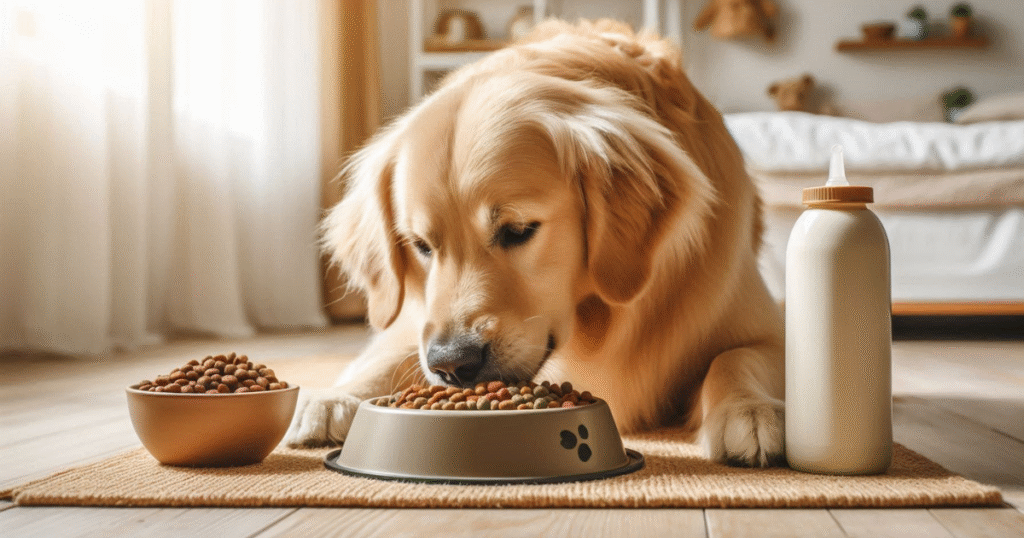
Links will be automatically removed from comments.